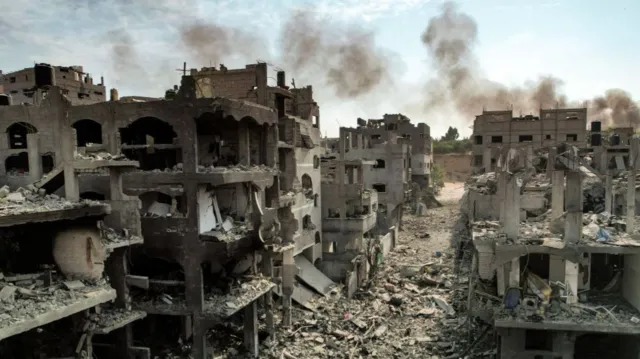
Trump Gaza Plan Challenges International Law
Trump’s blunt remarks, including his description of Gaza as a space to be “cleaned out,” have reframed discussions surrounding the territory. His administration’s claim that this is a humanitarian gesture has done little to counter global concerns. Under international law, forcibly transferring populations is strictly prohibited, and many see the Trump Gaza plan as a concerted effort to expel Palestinians from their homes and lands.
In a joint statement, Egypt, Saudi Arabia, the United Arab Emirates, Qatar, and the Arab League said the proposal could “escalate tensions and undermine prospects for peace and coexistence.”
Much of the criticism also stems from Trump’s suggestion that the US would oversee Gaza’s future. During a White House press conference, he spoke about turning the territory into the “Riviera of the Middle East,” stating that “the world’s people” would be welcome there, but without clarifying under what conditions Palestinians could return.
Middle East envoy Steve Witkoff added, “This guy knows real estate,” attempting to position the proposal as an economic opportunity. However, skeptics call it an impractical and dangerous gamble that disregards the realities of the region.
Palestinian Reactions and Arab Leaders’ Dissent
Palestinians, as well as Arab nations, have outright rejected the Trump Gaza plan . Many see Trump’s vision as an attempt to permanently uproot more than two million Palestinians from their homeland. Gaza is home to families who fled or were displaced during the conflict surrounding the creation of Israel in 1948 and the wars of 1967. These refugees and their descendants make up the majority of Gaza’s population today.
Arab leaders, in their statement over the weekend, warned that resettling Palestinians in other Arab countries is not an acceptable solution. They argued that such a move would constitute collective punishment and called for renewed efforts toward a two-state solution based on mutual recognition and coexistence.
The ultranationalist settler movement in Israel, however, has welcomed Trump’s words. Many in Prime Minister Netanyahu’s political base see the plan as a way to bring an end to Gaza as a perceived security threat. For them, Trump’s vision aligns with long-standing calls to expand Israeli settlements into occupied territories.
The Gaza Plan and the Future of the Two-State Solution
If implemented, the Trump Gaza plan would eliminate any possibility of a two-state solution as traditionally envisioned. By proposing to relocate Palestinians en masse and effectively vacate Gaza, Trump’s plan would redraw the region’s geopolitical map, departing radically from decades of international diplomacy on the matter.
Observers have pointed to the implications of these actions for ordinary Palestinians. Forced relocation would not only create an unparalleled humanitarian crisis but would also represent a form of collective punishment, widely condemned under human rights law.
While these ideas have sparked outrage globally, they have received support from segments of Netanyahu’s far-right coalition, who view the proposals as aligning with their calls for permanent Israeli settlements in Gaza.
Repercussions of Trump’s Proposal
Trump’s Gaza plan could transform the region more radically than any US intervention since 1948 or the 1967 wars. However, the backlash has been swift. Critics are concerned about the destabilizing effects this could have on Middle Eastern politics, especially at a time when tensions are high following the October 2023 attacks in Israel.
Arab nations, already wary of US involvement in the region, have warned that this move risks triggering a broader regional conflict. The Palestinian Authority has stated that they will pursue international legal avenues to counter what they call an “explicit agenda for expulsion.”
Even within the US, Trump’s plan has divided opinion. Some argue that the proposals are driven more by Trump’s real estate-oriented vision than practical solutions for one of the world’s most contested territories. Others worry that committing American resources to such a plan could lead to prolonged military engagements.
For Palestinians, however, the stakes are clear. Trump’s plan represents not just the loss of their homeland but also a critical shift in the global consensus supporting the right to return. The coming months will determine whether his vision gains traction or collapses under the weight of international criticism.
External Link :
Read more on Trump’s Middle East proposals at BBC
Internal Link :
Learn about other global political conflicts





